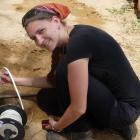
Programme Officer
Mélanie is a water and sanitation engineer working in the WASH sector since 2002. She worked 5 years in the private sector in hydraulic design and construction followed by 7 years in the humanitarian and development sector. Mélanie has an extensive field experience as WASH programme manager and coordinator mainly in emergency contexts, and was based and worked in various countries in Africa, Asia and the Middle East.
She joined IRC in 2012 as a Programme Officer and has been involved in various research and monitoring initiatives, mainly in the field of sanitation, hygiene and MUS (Multiple Use of water Services). Mélanie is the facilitator of the online life-cycle costing training and is working with UNCHR to adapt the life-cycle cost approach to emergency contexts.
Languages: English, German, French, Spanish
Among Sanitation and Water for All (SWA) partners there is lowered confidence especially in managing untreated wastewater and faecal sludge. Non-... Read more...
Management of WASH systems in Rural Communities: citizens can make a change. Read more...
This book/learning tool presents an approach for the comprehensive and integrated management of faecal sludge in urban and peri-urban areas of low-... Read more...
This report reviews the global progress made towards achieving SDG 6. It builds on the latest data available for the 11 SDG 6 global indicators. Read more...
This presentation describes how the NGO Splash uses schools as catalysts to promote city-wide community water, sanitation and hygiene (WASH) coverage. Read more...
A discussion on ways to use existing systems to improve scale and sustainability of hygiene promotion efforts. Read more...
Neither rural sustainability checks, nor urban benchmarking frameworks, are entirely suitable for monitoring small town water services. Read more...
Interventions that ensure women have access to private facilities with water for Menstrual hygiene management (MHM) and that educate women about... Read more...
This brief presents the lessons learnt and advocacy messages from this e-discussion for influencing sector discourse on this topic and ensuring that... Read more...
The District Strategy for achieving full water coverage (2017 to 2025) provides the framework for the implementation of water activities and services... Read more...
Strengthening and clarifying the capacity of local government institutions is critical to the success of SDG6 (Water) and contributes to SDG16 (... Read more...
This paper briefly describes the state of the evidence on menstrual hygiene management (MHM) in schools, the remaining knowledge gaps, and potential... Read more...
This paper presents findings on water and sanitation service levels from 16 small and medium towns in four regions of Ethiopia. Read more...
Spreading the cost of faecal waste removal over a series of monthly payments could make it more affordable for poor households and help kick start... Read more...
Political commitment to sanitation can be translated to results on the ground through: prioritisation throughout all government departments and... Read more...
Poster showing main research questions around an appropriate technology for pit emptying in Zimbabwe. Read more...
This publication has been produced by IRC as part of its independent monitoring and knowledge management services to the ONEWASH Plus programme. The... Read more...
The global costs of achieving universal basic WASH by the year 2030 are achievable under current overall sector spending but sustained universal... Read more...